Pakistani Prime Minister Nawaz Sharif is in deep political trouble arising from a corruption scandal over his family fortune. The 67-year-old Sharif is in his third term as prime minister, having served twice in the 1990s before a decade in exile in Saudi Arabia. He has struggled to keep the army under civilian control throughout and unsuccessfully sought to reduce tensions with India. Pakistan is the most dangerous country in the world, where terrorists and nuclear weapons overlap.
Corruption controversy
The corruption scandal emerged more than a year ago, when the so-called Panama Papers were leaked from an offshore law firm in Panama. Investigators found that Sharif’s family had sizable amounts of money and assets in London, including four luxury flats that allegedly had been purchased with illegal proceeds. This week, a Joint Investigation Tribunal concluded that the family had assets far beyond their income and recommended the case to Pakistan’s Supreme Court. Sharif’s daughter, Maryam, is accused of producing fraudulent documents as well, including one that allegedly uses a type font that was only available after the date on the document. His sons are also under a cloud of suspicion.
A key part of Sharif’s defense rests on the testimony of the former Qatari prime minister, Hamid bin Jassim bin Jaber al-Thani (HBJ). HBJ was a business partner of Sharif and has provided written evidence to corroborate Sharif’s claims about how he legitimately acquired the London properties. But the tribunal has rejected the Qatari’s letters.
Opposition parties and influential media outlets are now calling for Sharif to resign. So far the family is refusing, instead demanding their day in court. A decision could come soon. The prime minister’s term in office expires next year, but he can call for early elections.
Enter the army?
The army is the most powerful institution in Pakistan and has a long history of removing prime ministers its leadership dislikes. Sharif has been in the army’s crosshairs since he accepted President Bill Clinton’s call for a unilateral cease fire during the 1999 Kargil war with India. When Sharif pulled back Pakistani troops in the ceasefire, he set the stage for the coup that ousted him months later and resulted in his exile to Saudi Arabia. He was able to return only after the 2007 collapse of General Pervez Musharraf’s dictatorship. His 2013 election was the first time in the country’s history that one elected government turned over power to another elected government.
There has been an uneasy accommodation between the army and Sharif.
In the last four years, there has been an uneasy accommodation between the army and Sharif. The generals have stayed on the sidelines in the Panama Papers scandal, although several of the members of the tribunal are army appointees. There is little doubt, however, that the army would like to see the civilian administration weakened and its old foe ousted.
Sharif’s fitful attempts to improve Pakistan’s troubled relations with India since the 1990s lie at the core of the army’s dislike for him. He has also sought to persuade the Afghan Taliban to negotiate with the government in Kabul, a stance that the army opposes as well. Sharif has kept Pakistan out of the Saudi war in Yemen for over two years, producing serious strains in Pakistan’s ties to Riyadh, and more recently he has been neutral in the Qatari dispute with the Kingdom.
All in the family
If Nawaz did step down, he could be replaced by his brother Shahbaz Sharif, who is currently the chief minister of Punjab—Pakistan’s most important province and the family’s power base. Shahbaz is a capable and experienced leader who would govern with continuity. He has so far largely escaped the taint of the scandal and he is popular among the ruling party. However, he would be inheriting an ongoing scandal and crisis.
Instability in Pakistan is dangerous for the United States and the world. Pakistan has the fastest growing nuclear weapons program in the world, along with intermediate-range ballistic missiles, American supplied F16 jets, and efforts to develop tactical nuclear weapons. It is also home to numerous terrorist organizations, including Lashkar-e-Tayyiba, the Haqqani network, and al-Qaida’s emir Ayman al-Zawahiri. It has been the target of dozens of terrorist attacks by the Pakistani Taliban. The border with India is tense after a series of violent incidents. It is also China’s closest ally, and Sharif is responsible for negotiating an enormous $50 billion development deal with Beijing.
The Trump administration is still reviewing U.S. policy toward Pakistan. The president avoided a bilateral meeting with Sharif when they both were in Saudi Arabia in May, which has been interpreted in Islamabad as a signal of cooling ties. The corruption scandal is outside of Washington’s influence, but how it plays out will have significant consequences for South Asia and beyond.
The Brookings Institution is committed to quality, independence, and impact.
We are supported by a diverse array of funders. In line with our values and policies, each Brookings publication represents the sole views of its author(s).

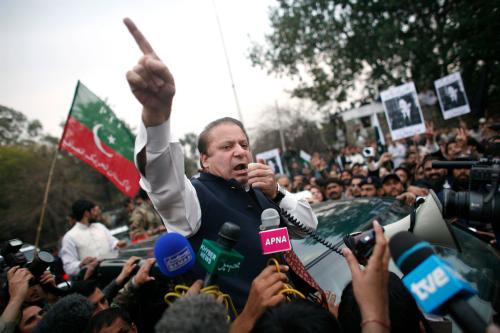
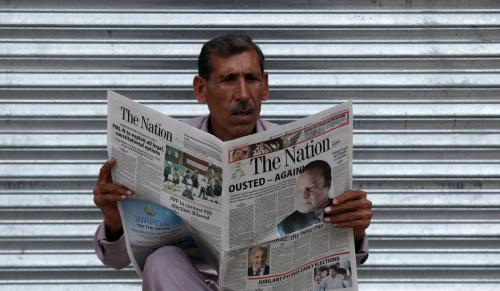
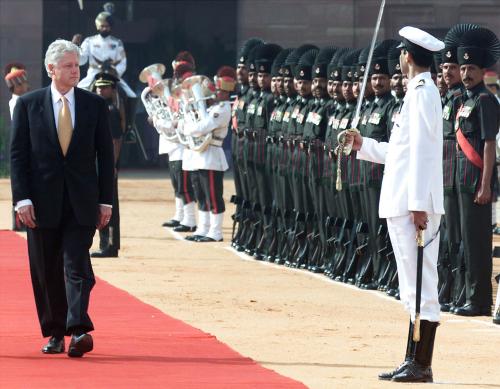

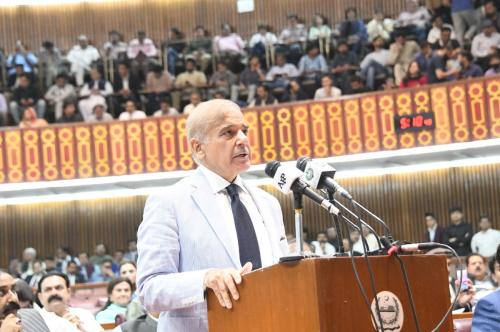
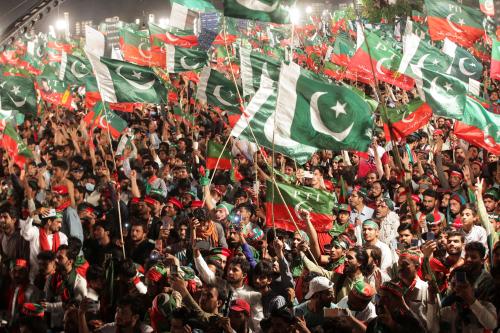
Commentary
A corruption crisis rocks the most dangerous country in the world
July 13, 2017